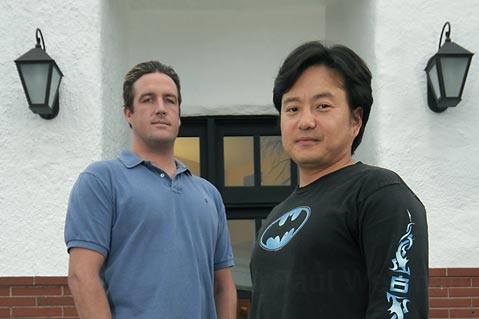No Due Process
Federal Judge Sides with Pot Shop Owners

Federal judge Dean Pregerson ruled in favor of owners of The Green Well medical marijuana dispensary, located at 500 North Milpas Street, finding that provisions of Santa Barbara’s new dispensary ordinance — passed June 29 — violated due process protections in the Constitution by forcing owners Nat Reinke and James Lee to close down their pot shop by January 29. The new Santa Barbara ordinance limits the number of pot shops within city limits to a maximum of three. In addition, the ordinance bars pot shops from existing within 600 feet of schools. But Reinke and Lee obtained all their city permits weeks before the new ordinance was passed.
At that point, dispensaries had to maintain a 500-foot distance from schools. Because Green Well is located 532 feet from Santa Barbara Junior High School, city hall effectively revoked its permits. Green Well was given a six-month grace period to go out of business. Instead, it sued, arguing city hall could not change the rules after the fact, especially when they’d invested $511,000 remodeling their new shop.
Last Wednesday, Pregerson issued a temporary restraining order barring the city from enforcing the six-month provision of the ordinance until the merits of Reinke and Lee’s claims against city hall could be resolved in court. But in his 10-page opinion, Pregerson made it plain he thought they would prevail. City Attorney Steve Wiley said it was clear that Pregerson was predisposed against the city’s legal position and that he was not surprised by the ruling. Whether Wiley files an appeal depends how the City Council — badly split on medical marijuana — wants to respond.
Pregerson’s ruling will likely extend to The Green Light dispensary on Olive Street, whose owners were also given six-months notice by city hall. They, like the owners of Green Well, sued the city, arguing they had vested rights because they relied on their city permits when deciding to invest in their new business. Because Pregerson is hearing The Green Light case as well, Wiley expects the ruling to go against city hall.
Ironically, the six-month “amortization” provision was included in the ordinance at the behest of former councilmember Das Williams, perhaps the most outspoken supporter of medical marijuana dispensaries on the council. (Williams also was the one to change the school buffer requirement from 500 feet to 600 feet.)
Pregerson argued that because Reinke and Lee obtained all the necessary city permits and invested substantial sums in the dispensary, they had vested rights. Reinke and Lee claim they spent $511,000; Wiley claims the real number is closer to $48,000. It didn’t matter, wrote Pregerson; it was still enough to vest Reinke and Lee. Typically, he opined, when a city adopts more stringent zoning rules, existing nonconforming uses are allowed far more than six months to meet the new city rules or shut down. Given that the city was allowing only three dispensaries, he found that Reinke and Lee were placed in “an impossible situation, forcing Plaintiff to close its business and lose its permit without due process.” He also concluded, “Plaintiff is faced with either a violation of its constitutional rights or the loss of its business. The Ninth Circuit has held that such stark circumstances constitute irreparable harm.”
Should Pregerson’s ruling stand, and Green Well and Green Light remain open, it begs the question of the new ordinance’s three dispensary limit. Seven dispensaries are now known to be in business, according to city planner Danny Kato. Pacific Coast Collective — on the 300 block of North Milpas — has all the necessary permits and meets the new ordinance’s buffer requirements, but its owner, Jeff Restivo, is facing felony charges for operating beyond the scope allowed for medical marijuana dispensaries, the legal definition of which has been a swiftly moving target. Kato said three longstanding dispensaries — two just off State Street and one on De la Vina Street — have submitted complete applications to city hall and will be reviewed next week. What bearing Pregerson’s ruling will have on these operators and their applications — if any — has yet to be seen.



